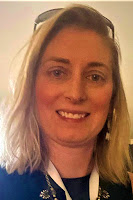 |
| Publisher Ellen Kreth |
The Record learned of the case from parents of the victims, who approached the newspaper to make sure the allegations weren’t swept under the rug and school officials were held accountable. The paper didn’t name any students involved, but did report that the school board reduced or rejected the recommended punishment for the violators. It focused on how officials handled the allegations. It reported the district’s failure to immediately report the allegations, as required by law, and multiple open-meetings violations of the Arkansas Freedom of Information Act.
The newspaper’s reporting prompted an investigation by the county sheriff; special open-meetings training for the school board, which didn’t do it in the time required; a lawsuit by a parent alleging violations of Title IX of the Education Amendments of 1972, which ban sex-based discrimination in any school that gets federal funding; the board’s admission of liability in that suit; and the electoral defeat in May of three of the four board members who sought re-election.
 |
| Madison County (Wikipedia map) |
“The school district fought us each step, publicly criticizing our editorial decisions and the credibility of our reporting,” Kreth told the Institute for Rural Journalism. “The school board claimed ignorance for never having previously handled a Title IX investigation. It failed to provide notice of meetings, claiming a newspaper should not cover student discipline. Based upon our reporting, a parent sued the district for the open-meetings violations and won.” The district asked for a gag order, and the paper hired legal counsel to intervene in the case on that issue and won. That allowed parties to the case, “including victims, to continue to speak to us, helping ensure accuracy in every article,” Kreth wrote.
 |
| Gen. Mgr. Shannon Hahn |
Kreth started out as a journalist and became a lawyer, but got back into journalism in 2002 when she inherited the newspaper from her grandmother. She said that her knowledge of freedom-of-information law prevented officials and their lawyers from intimidating her, and that the paper’s use of the laws has made readers more aware of them, to the point that they come in asking how to file an open-records request.
 |
| Reporter Celia Kreth |
The Tom and Pat Gish Award is named for the couple who published The Mountain Eagle in Whitesburg, Ky., weekly for more than 50 years and repeatedly demonstrated courage, tenacity and integrity through advertiser boycotts, business competition, declining population, personal attacks, and even the burning of their office by a local policeman who state police believe was paid by coal companies.
Author and journalist Bill Bishop of LaGrange, Texas, who worked for the Gishes and is a member of the award selection committee, said of the winners’ work, “I can't imagine a harder issue to pursue in a community. And the open-records fight is straight out of early Tom and Pat.”
The Gishes, who died in 2008 and 2014, respectively, were the first winners of the award, in 2005. The other winners, in chronological order, have been the Ezzell family of The Canadian (Texas) Record; Stanley Dearman (former publisher, now deceased) and Jim Prince (publisher), The Neshoba Democrat, Philadelphia, Miss.; Samantha Swindler of Portland, Oregon, for her work at the Jacksonville (Texas) Daily Progress and the daily Times-Tribune of Corbin, Ky.; Stanley Nelson and the Concordia Sentinel of Ferriday, La.; Jonathan and Susan Austin, publishers of the now-defunct Yancey County News in Burnsville, N.C.; the late Landon Wills of the McLean County News in Calhoun, Ky.; the Trapp family of the Rio Grande Sun in Española, N.M.; Ivan Foley of the Platte County Landmark in Platte City, Mo.; the Cullen family of the Storm Lake (Iowa) Times; Les Zaitz of the Malheur Enterprise in Vale, Oregon; Ken Ward Jr., then of the Charleston Gazette-Mail and now of Mountain State Spotlight, along with his mentor, the late Paul J. Nyden of the Charleston Gazette and Howard Berkes of NPR; the late Tim Crews, editor-publisher of the Sacramento Valley Mirror in Willows, Calif.; and the Thompson-High family of The News Reporter in Whiteville, N.C.
The Gish Award will be presented Nov. 3 at the annual Al Smith Awards Dinner at the Embassy Suites Lexington on Newtown Pike near Interstate 64/75. The keynote speaker will be Renee Shaw, public-affairs director for Kentucky Educational Television.
The annual dinner also honors recipients of the Al Smith Award for public service through community journalism by Kentuckians, which the institute presents with the Bluegrass Chapter of the Society of Professional Journalists. The 2022 winners of the Smith Award are Chris Evans and Allison Mick-Evans of The Crittenden Press, a small weekly in West Kentucky that has punched above its weight and persevered for almost 30 years in the face of increasing challenges, most recently a city water crisis in which it has been an information lifeline.
Dinner tickets for non-SPJ members are $125 each; table sponsorships are $1,250. For more information, contact Al Cross at al.cross@uky.edu.



